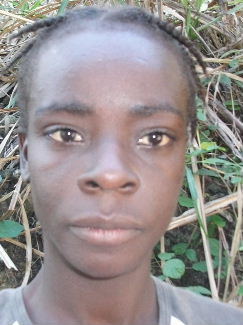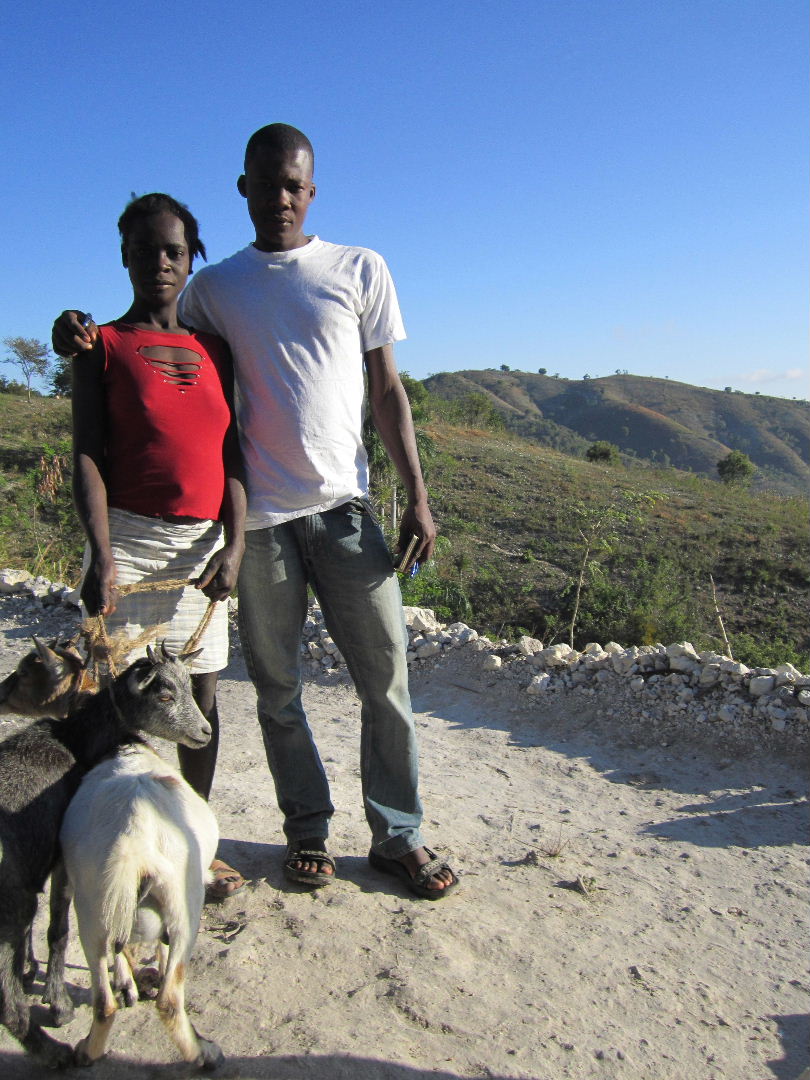I’ve written about Jonise before. (See: Jonise And Gladys.) She is a CLM member from Bay Tourib. When I first met her, she was homeless, living with a fellow CLM member because she had nowhere else to go. As I wrote at the time, Jonise “had been living with her children’s father, in a house on his mother’s land, when he decided he’d had enough of her. He threw her out. Her neighbor became fond of her while they were in enterprise training together, and when she saw her out in the street, she invited her into her home.”
At the time I wrote, we had been most struck by the steep challenges facing Jonise. She seemed confused. Not only was she unable to say how old she was — that’s common enough here — but also she didn’t know how old her children were. A neighbor told us that the kids were about five and three. The three-year-old girl died shortly after we started working in Bay Tourib. She also had, and still has a problem with writing. Not only was she unable to write her name, she couldn’t really that copy letters that her case manager wrote for her in her notebook. Here is a photo of Jonise’s copy book. Benson, her case manager, assigned her to practice writing “ni.” You can see the effort she has made, filling the page. But somehow she’s not seeing the letters clearly enough to copy them.

What’s worse, she is one of a small percentage of CLM members who “pa konnen lajan,” or don’t “know money.” In some cases, that means that someone can’t distinguish different denominations; in some, it means that they can’t do the simple arithmetic necessary to calculate change. In Jonise’s case, both were true.
So Benson started working hard with her. She didn’t choose small commerce as one of her two enterprises. It wouldn’t have made sense for someone who can’t make change. But she could never be really independent without learning to handle money, so Benson started by paying close attention to how he was giving her the weekly 300-gourd food stipend. He would vary it, using bills of different denominations: 25, 50, 100, and 250 gourds. He was careful to insist that she always count the money in front of him. Within a couple of months, she was identifying all denominations accurately. He also started teaching her math, using piles of small stones to help her add and subtract.
He talked to the father of her child, and they agreed that, whether or not the man is together with Jonise, he has a responsibility to his child. So they found one of her cousins willing to give her a small piece of land, and the man put up a frame of a new house for his little boy and Jonise. H covered it with the palm tree seed pods that are the poors’ standard roofing material. Benson then helped Jonise save up 500 gourds from her food stipend, and she used it to pay a builder to put up the walls.
Now Jonise and her boy are in a nice little house. Soon, she will have the roofing material replaced with the corrugated tin that we’ve given her. The house is small enough that she’ll be able to sell some extra tin roofing and use that money for something else. She’s taking good care of her goats and her pig, and may use the money to buy more livestock.
Most importantly and impressively, she’s started a small commerce. She invested only about 400 gourds, about $10, in rice and sugar. She saved that money from her weekly food stipend. Now she runs her little business from out of her home. It brings in just enough to keep her and her little boy fed.
The biggest difference is in Jonise herself. It’s visible. Jonise on the left is Jonise when we first met her. On the right, you see the new Jonise.
She is now cheerful and alert. She chats happily with her neighbors, even advocating for one fellow CLM member who had a problem the day we visited her to get us to go by the troubled woman’s home.
She has a long way to go. We need to help her learn to sign her name, and that won’t be easy. She’ll have to keep working at care for her livestock, and her small commerce as well. But she’s committed to the fight, to working with her case manager to continue to change her life. And she’s seems, to us, very likely to succeed.

With her case manager, Benson Pierre Derat